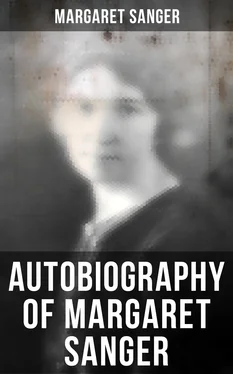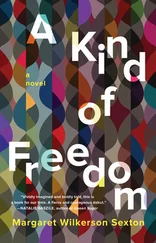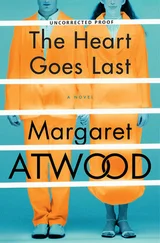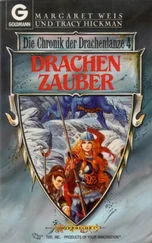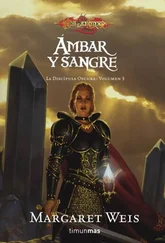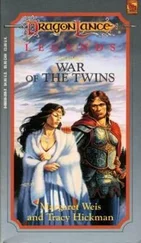1 ...6 7 8 10 11 12 ...30 Due to my “advanced ideas,” for a time, at least, I am sorry to say, it was chiefly the grinds with whom I “walked in Lovers’ Lane,” nodding wisely and answering their earnest aspirations with profound advice. But this did not last. Soon I was going through the usual boy and girl romances; each season brought a new one. I took none of them very seriously, but adroitly combined flirtatiousness with the conviction that marriage was something towards which I must develop. Therefore I turned the vague and tentative suggestions of my juvenile beaus by saying, “I would never think of jumping into marriage without definite preparation and study of its responsibilities.” Practically no women then went into professions; matrimony was the only way out. It seems ages ago.
Various pranks occurred at Claverack, such as taking walks with boys out of bounds and going to forbidden places for tea. Towards the end of my last year I thought up the idea that several of us should slip out through the window and down to the village dance hall where our special admirers would meet us. About eleven-thirty, in the midst of the gayety, in walked our principal, Mr. Flack, together with the preceptress who had come for the “ladies.” We were all marched back to school, uneasy but silent.
The next morning I received a special invitation to call at The Office. I entered. Mr. Flack, a small, slight, serious, student type of man, with a large head and high brow, was standing with his back to me. I sat down. He gave me no greeting but kept on at his books. To all appearances he did not know I was there. Then, without looking around, he said, “Miss Higgins, don’t you feel rather ashamed of yourself for getting those girls into trouble last night, by taking them out and making them break the rules? They may even have to be sent home.”
Although surprised that he should have known I was the one responsible, I could not deny it, but it flashed across my mind at first that someone must have told him. He went on with rapid flow, almost as though talking to himself, “I’ve watched you ever since you came and I don’t need to be told that you must have been the ringleader. Again and again I’ve noticed your influence over others. I want to call your attention to this, because I know you’re going to use it in the future. You must make your choice—whether to get yourself and others into difficulty, or else guide yourself and others into constructive activities which will do you and them credit.”
I do not quite recall what else he said, but I have never forgotten going out of his room that day. This could not exactly be called a turning point in my life, but from then on I realized more strongly than before that there was a something within myself which could and should be kept under my control and direction.
Long afterwards I wrote to thank Mr. Flack for his wisdom in offering guidance instead of harsh discipline. He died a few years later, and I was glad I had been able to place a rose in his hand rather than on his grave.
I spent three happy years at Claverack. The following season I decided to try my hand at teaching, then a lady-like thing to do. A position was open to me in the first grade of a new public school in southern New Jersey. The majority of the pupils—Poles, Hungarians, Swedes—could not speak English. In they came regularly. I was beside myself to know what to do with eighty-four children who could not understand a word I said. I loved those small, black-haired and tow-headed urchins who became bored with sitting and, on their own, began stunts to entertain themselves. But I was so tired at the end of the day that I often lay down before dressing for dinner and awakened the next morning barely in time to start the routine. In very short order I became aware of the fact that teaching was not merely a job, it was a profession, and training was necessary if you were to do it well. I was not suited by temperament, and therefore had no right to this vocation. I had been struggling for only a brief while when father summoned me home to nurse mother.
She was weak and pale and the high red spots on her cheek bones stood out startlingly against her white face. Although she was now spitting blood when she coughed we still expected her to live on forever. She had been ill so long; this was just another attack among many. Father carried her from room to room, and tried desperately to devise little comforts. We shut the doors and windows to keep out any breath of the raw March air, and in the stuffy atmosphere we toiled over her bed.
In an effort to be more efficient in caring for mother I tried to find out something about consumption by borrowing medical books from the library of the local doctor, who was a friend of the family, and in doing this became so interested in medicine that I decided definitely I would study to be an M.D. When I went back for more volumes and announced my decision the doctor gave them to me, but smiled tolerantly, “You’ll probably get over it.”
I had been closely confined for a long time when I was invited to Buffalo for the Easter holidays to meet again one of the boys by whom I had been beaued at Claverack. Mother insisted that I needed a vacation. Mary and Nan were both there; I could stay with them, and we planned a pleasant trip to Niagara Falls for the day.
With me out of the way mother sent off the little children one by one on some pretext or another. She had more difficulty with father. The fire bricks in the stove had split and she told him he must go to town and get new ones. Much against his will, because he was vaguely unquiet, he started for the foundry. He had left only because mother seemed to want it so much, but when he had walked a few blocks, he found he could not go on. For some Celtic mystic reason of his own he turned abruptly around and came back to the house. Mother was gasping in death. All the family hated scenes, she most of all. She had known she was to die and wanted to be alone.
It was a folk superstition that a consumptive who survived through the month of March would live until November. Mother died on the thirty-first of the month, leaving father desolate and inconsolable. I came flying home. The house was silent and he hardly spoke. Suddenly the stillness of the night was broken by a wailing and Toss was found with his paws on the coffin, mourning and howling—the most poignant and agonizing sound I had ever heard.
I had to take mother’s place—manage the finances, order the meals, pay the debts. There was nothing left for my clothing nor for any outside diversions. All that could be squeezed out by making this or that do had to go for shoes or necessities for the younger brothers. Mend, patch, sew as you would, there was a limit to the endurance of trousers, and new ones had to be purchased.
To add to my woes, father seemed to me, who was sensitive to criticism, suddenly metamorphosed from a loving, gentle, benevolent parent into a most aggravating, irritating tyrant; nobody in any fairy tale I had ever read was quite so cruel. He who had given us the world in which to roam now apparently wanted to put us behind prison bars. His unreasonableness was not directed towards the boys, who were in bed as soon as lessons were done, but towards his daughters, Ethel and me. Whatever we did was wrong. He objected particularly to young men.
Ethel was receiving the concentrated attention of Jack Byrne. Father in scolding her said she should mix more. My beaus were a little older than the ones I had had at school, and more earnest in their intentions. Though not one really interested me—their conversation seemed flat, consisting of foolish questions and smart, silly replies—father scolded me also about them, “Why aren’t you serious like your sister? Can’t you settle yourself to one? Do you have to have somebody different every evening?”
Читать дальше
